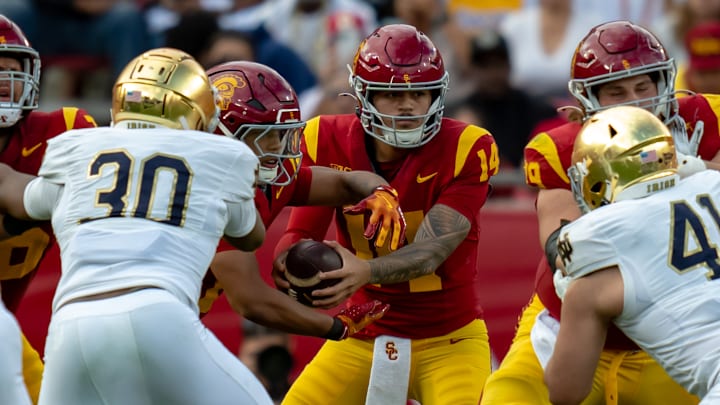There are a lot of moving pieces in college football. USC's reluctance to schedule something long-term during the middle of Big Ten play was further vindicated, however, when news broke of the latest changes to the College Football Playoff format.
Programs are forced to go after and pursue whatever is incentivized. For those hoping for USC to blink first and allow the Fighting Irish to dictate a continued November matchup between the two schools, they will have received a significant setback regarding that particular crusade.
As released by ESPN's Heather Dinich, the College Football Playoff will now see the top four ranked teams in the nation seeded one through four, regardless of conference affiliation. This allows the possible (though unlikely) scenario of the Big Ten having the top four seeds and being able to host after receiving a first-round bye.
While that specifically would be a complete outlier, that type of example should hopefully illustrate why the conference considerations simply have to take priority for the Trojans.
Although the conference winners are still rewarded with a place in the CFP, their seeding is not assumed; only a ticket to the dance is.
This makes it so that a late loss, even in a close, entertaining matchup against a non-conference power, would have extremely detrimental effects on any program's standing, while not reaping too much further benefit on the reverse side of things.
Especially with a strong regular season resume as a non-champion now receiving a boost with this change, it makes it all the more reason for USC to continue to stay firm in the current disagreement with Notre Dame.
Further reason why USC is playing this the right way
Even setting the win or loss aspect aside in this fixture, at that time of year, serious programs have to be focused on their conference opponents. That's the way forward for any team. This is only proven in how others, like those from the SEC, schedule their available slots during this timeframe.
There also isn't anything saying that this will be the last of more changes to come. For now, while everything is still in flux, this latest development at least shows why USC was right to not rush into any multi-year extension with a stubbornly half-independent, half-ACC school.
